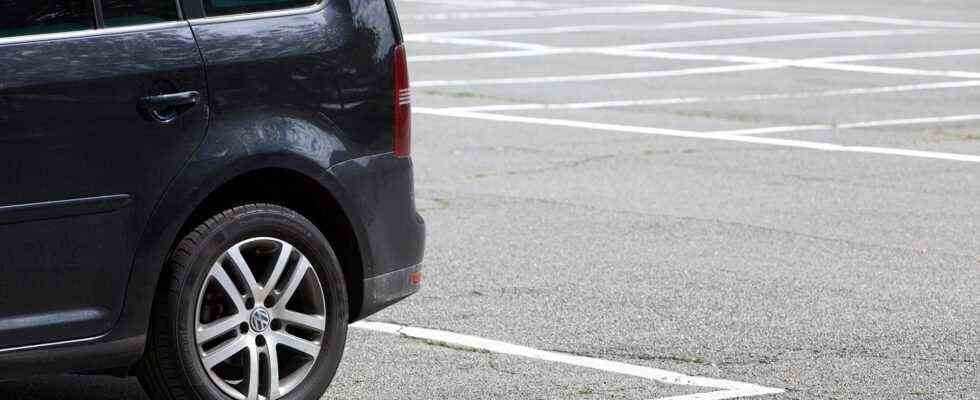Status: 06/26/2021 1:45 p.m.
The Pfando company buys cars from people who need money – and want to continue driving. More and more courts consider the business model to be illegal. But the authorities do not intervene.
Melanie Schmidt, who actually has a different name, defends herself against Pfando in court. She wants her money back. It’s about thousands of euros. Her accusation: The Pfando company lured her into a contract to her disadvantage through incorrect advice.
After the consultation in the Berlin branch, Schmidt assumed he would get some kind of loan. The employee told her that she could pay it off and then simply redeem her car later, although the contract does not provide for that.
Pfando bought the car from her for 3,000 euros; she was allowed to continue driving and paid a monthly rent of just under 300 euros. After about six months, she wanted the car back. Pfando initially stood up and wanted significantly more than the company paid for the vehicle. Schmidt bought it back from Pfando for a proud 4200 euros. In total, she paid almost 7,000 euros in rent and repurchase price to Pfando.
OLG Frankfurt: Pfando model illegal
Examples like this show why the so-called buy-back trade is prohibited in Germany. Legislators want to protect consumers from having to buy back cars at high prices and thereby becoming even more indebted. In contrast, there are clear rules for loans from banks or pawn shops.
But does Pfando operate such a buyback trade? The Frankfurt Higher Regional Court affirmed this in a judgment of 2020 (AZ 2 U 90/19). Even if Pfando explicitly excludes a right of repurchase in its contracts: In fact, customers would have the option of buying their car back. “According to the economic approach adopted by the Senate, it was to be assumed that the respective customer has an interest in getting the vehicle back,” says court spokeswoman Gundula Fehns-Böer.
This interest is taken into account by the fact that the customer can either bid for the vehicle or buy it again. The majority of other courts followed the judgment of the Frankfurt Higher Regional Court, only a few local or regional courts see it differently.
Financial supervision sees no reason to take action against Pfando
In order to generally protect customers from the business model, the responsible authorities would have to take action. Mathias Casper, Professor of Banking Law at the University of Münster, has looked at the OLG judgment and sees an urgent need for action. Pfando actually needs a banking license for his business: “In reality, this is a loan business and not a classic pawnbroking business,” says the banking law professor. Since Pfando apparently does not have a banking license, the Federal Financial Supervisory Authority, BaFin, has to intervene.
BaFin considers itself responsible in principle, but does not see any buyback trade in Pfando’s business model – and relies solely on the text in the company’s contracts. “Insofar as courts recognized a buyback trade in individual decisions, these were individual cases in which the individual employee had, in breach of duty, promised the customer the possibility of a buyback”, writes the authority on the judgment of the Frankfurt Higher Regional Court on request. The court had expressly argued that, due to the business model of Pfando, a buyback trade can generally be assumed.
The Berlin-Charlottenburg public order office, where Pfando is based, could also act. The authority has been investigating Pfando for at least a year – so far without any result.
Pfando branch manager: 90 percent of customers buy back cars
WDRResearch provides evidence that Pfando does not only buy back cars in individual cases. The buyback is part of the business model, confirms a former employee. He worked in the Pfando call center for a few weeks. In consultations on the phone, no right of repurchase is promised. But there is always the option, he says. In any case, that’s what the consultants would have suggested to the customers. Another indication: a Pfando branch manager at the Nuremberg Regional Court said at the beginning of June that in around 90 percent of cases, customers bought back the car at the end of the contract.
Pfando does not want to comment on this on request, but admits: “If the contract is fulfilled, there is the possibility of purchasing the vehicle as part of the auction. (…) Our aim is that customers do not only use our model once to take.” More than a third of the customers are regular customers, the company writes. At the same time, Pfando denies engaging in a prohibited buyback trade.
Right of customers to a refund of VAT?
There are also tax inconsistencies at Pfando: The company’s lawyer said before the Mannheim Regional Court that Pfando was not entitled to input tax deduction. That means: With the Pfando model, no value added tax would be incurred. Quite understandable, says Joachim Englisch, tax law expert at the University of Münster. Because the Pfando model is VAT-exempt if it is a credit transaction.
However: Pfando points to the bills and in the rental agreements, which the WDR are available, 19 percent VAT – contrary to the statements of the Pfando attorney. From the point of view of the English tax lawyer, customers could claim back the VAT paid to Pfando. When asked, the company asserts that it does fall under the VAT obligation and that it pays it properly to the tax office.
Melanie Schmidt hopes that she will get justice in court and that Pfando will have to repay her 6900 euros. Your lawyer Holger Schilling thinks your chances are good. He also finds it important to generally protect consumers from the business model: “The banking supervisory authority would have to intervene and, if necessary, issue a ban.”
Pfando
Philipp Raillon, WDR, June 25, 2021 12:28 p.m.

